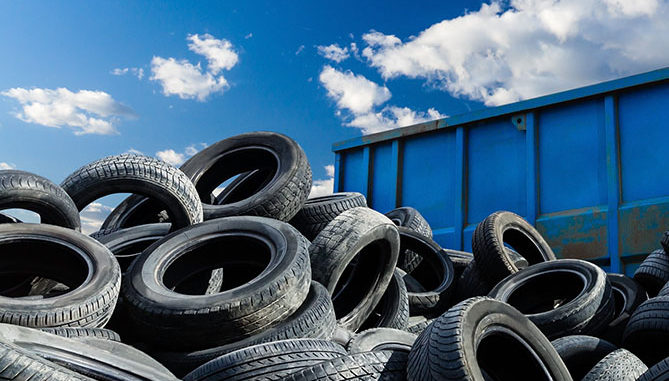Why do we recycle tyres?
Since 2002, whole tyres have been banned from UK landfills, and since 2006, end-of-life tyres have been banned from UK landfills too, thanks to the EU Landfill Directive. Due to these bans, we were forced to rethink our approach to tyre waste, and to good effect, with the UK now recycling and recovering almost 100% of waste tyres.
The EU Landfill Directive and various UK policies have been implemented over the last decade or two to help us change our approach to waste and become more resourceful as a nation. To answer, why do we recycle tyres, the first answer is ‘because we have to’, but the second, and perhaps better answer is ‘because it’s good for the environment, it’s a better use of resources, and it saves everyone money’.
Does the Waste Duty of Care affect tyres?
Manufacturers and end-users are both responsible for disposing of waste tyres in a responsible way. The customer who comes into the garage to get their tyres changed has a responsibility to work with a licensed waste carrier who will responsibly handle and manage their old tyres. Tyre dealers and tyre manufacturers alike must ensure that leftover tyre fragments are also recovered or recycled.
To answer the question, yes, the Waste Duty of Care plays a vital role in the end-of-life treatment and management of tyre waste.
Are there regulations for storing waste tyres?
Yes, there are legal regulations surrounding the storage of waste tyres because they are a major fire risk. Tyres are combustible, but they also contain certain chemicals that are very hazardous to human health and local ecology when burned.
To avoid tyre fires, which are a huge problem around the world, waste managers and safety managers must carry out detailed fire risk assessments, work with local authorities and regulators to enforce best practices, and ensure that everything is done correctly to prevent the fires being started. There are limits on how many tyres can be stored, especially on construction sites.
This guide from WRAP can help you.
What are the benefits of recycling tyres?
There are many! Here are four that we love:
- Recycling old tyres generates material that can be used to produce new tyres, making the production process more resourceful. This protects our natural assets and resources.
- Fewer tyres are thrown away carelessly and none make it to landfill. This helps to reduce pollution and stops tyres from ending up on roadsides, on fly-tip sites, and in local nature sites, like lakes and streams.
- As mentioned previously in this guide, recycling tyres reduces the chance that they will be stored in large amounts and catch fire, which can be deadly, costly, and very harmful to the environment.
- Recycling tyres saves a lot of carbon in the manufacturing process too. As much as 81lbs of CO2 can be saved per tyre when recycled tyre material is used instead of creating tyres with totally new materials.
How are tyres recycled?
With great difficulty! However, expert companies have created great systems and processes to separate the variety of materials contained within a tyre, such as steel, oil, rubber, plastic, textiles, and various chemicals.
After separating the larger pieces of a tyre, the tyre will be shredded in heavy machinery and turned into a granule. From this granule, any further non-rubber pieces can be easily retrieved.
What are recycled tyres used for?
If the right equipment is available, there is a lot that can be done with an old tyre. They can often be refurbished and re-treaded, meaning they can be used once again and will appear to be new tyres, but for sale at a fraction of the cost. As much as 50% of bus and truck tyres around the UK are retreaded.
Another common method for dealing with tyre waste is to incinerate tyres for energy production to be used in manufacturing. However, embedded within the tyres are oil and gas, but it’s very hard to extract these. Thanks to a process called pyrolysis, there is an energy recovery method even better than traditional incineration!
Of course, tyres can also be reused as a construction material, especially for civil engineering projects. It will typically find itself used to build roads, foundations, and in soundproofing too.
If none of the above takes place, another form of tyre recycling is ‘crumb rubber’. This requires an answer of its own.
How to recycle tyres into crumb rubber?
When all other materials have been extracted from the shredded, granulated, or crumbed rubber (depending on which term you prefer to use), the tyre waste can be reformed for many different purposes, such as for children’s playgrounds, speed bumps, and sports pitches. It could also end up as mudguards for vehicles, underlay for carpets, on roads, and on running tracks.
When used on roads, they are found to be quieter, with an equally strong grip. This is because the rubber and the bitumen work together to create an even stronger and thicker compound with soundproofing qualities.
Here at National Recycling, we have another great way of recycling our collected waste tyres. We granulate them and make the rubber available for equestrian use, helping horse farms to fill their schools with an inexpensive and suitable material for horses to walk on.
Where to recycle tyres (UK)?
Because you cannot send tyres to the landfill, or put them in your general waste, and because they are deemed to be hazardous waste, you must be very careful with disposing of your old tyres. To be compliant and not break the law, you need the professional help of a collection company.
There are many companies around the UK who can help you dispose of your waste tyres. They will arrange to collect them directly to save you any trouble, but remember, you have the responsibility to confirm that they are licensed waste carriers, or you could face a heavy penalty. To find a company locally to support your tyre disposal, look for car garages, tyre sales businesses, or waste treatment facilities. You can also contact your local council, who will be happy to refer you to some professional outlets and recommended recyclers.
Did we miss anything?
Contact us today if you have any more questions about tyre recycling and we will be happy to update this article.



